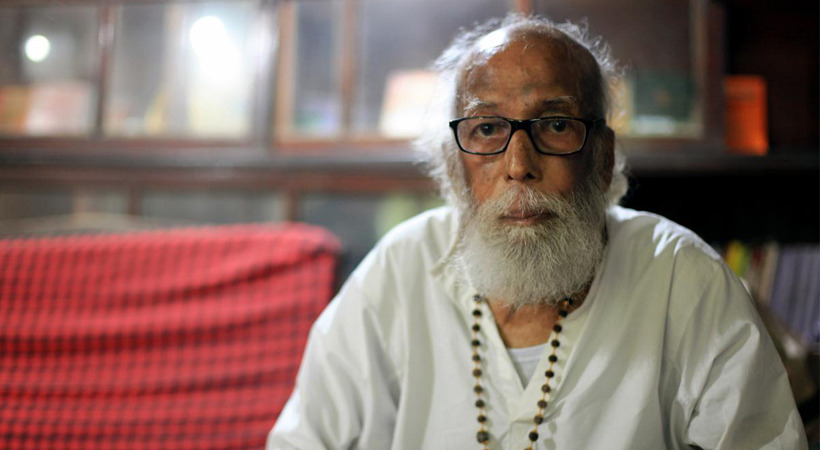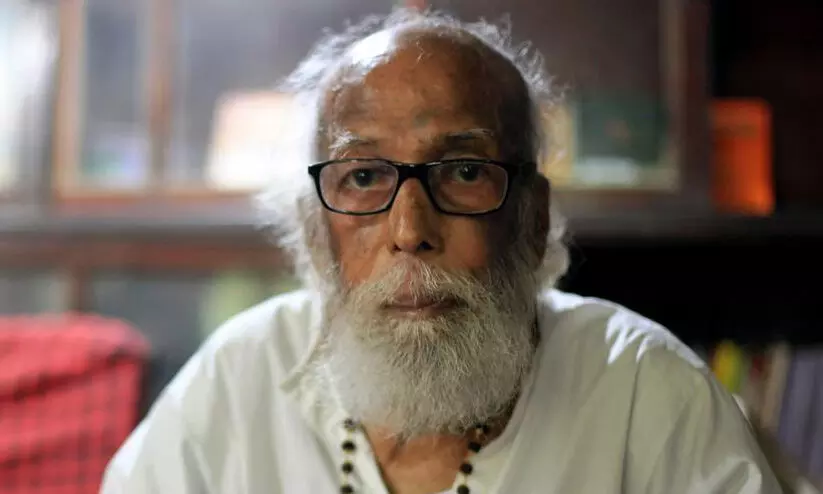
Dalit Bandhu: Chronicler of the Dispersed
N. K. Jose (February 2, 1929 – March 5, 2024) was an Indian historian and former President of the Kerala History Congress, renowned for his extensive studies on Dalit and Christian history in Kerala. The author of over 140 books on history and social issues, he was honored with the title Dalit Bandhu by Dalit organizations in 1990 in recognition of his contributions to Dalit studies.
N. K. Jose, widely known as Dalit Bandhu (Friend of Dalits), significantly expanded the body of Dalit literature in Kerala. His work is categorized as subaltern or indigenous history, highlighting the hidden stories of marginalized communities. He uniquely presented history from the perspective of the oppressed, offering a sharp contrast to the dominant narratives. Jose firmly believed that history is not just about the victors but also the vanquished. This perspective characterized much of his writing, which is now considered part of Dalit literature. Of his 141 works, 93 focused on Dalit history, while 28 explored Christian history. His first book, Capitalism in India, was published when he was just 23, and his last work was titled Who are the Indian Muslims?.
In 1990, the Coordination Committee of Dalit Organizations honored Jose with the title Dalit Bandhu for his contributions to Dalit literature. From that point onward, he adopted this title as his pen name. His engagement with Dalit literature began serendipitously. Initially, Jose was a devout Catholic and an idealist with a strong affinity for Gandhian and socialist movements. However, later in life, he openly stated that he no longer believed in religion or God. In the preface to his autobiography, he wrote, “I was born a Christian but wished to die a human.” Knowing that, as an atheist, he would be denied a place in the church graveyard, he took the unusual step of preparing his own grave in his backyard, ensuring that a person was assigned to bury him there. The words inscribed on his tomb read: “No matter how much you achieve, this is where you will end up.”

Despite his vast contributions, the recognition Jose received was modest. This paradox can be attributed to the fact that his writings often challenged the prevailing social consciousness and power structures. As Jose himself stated, “My history writing goes against their interests.” Though he was belatedly awarded the Kerala Sahitya Akademi Award in 2020 for his overall contribution, Dalit and backward-class organizations, such as the DHRM and SDPI, recognized his work much earlier. These accolades, displayed in a showcase near his home, serve as a testament to his impact.
The Man from Ambika Market
Jose was born on February 2, 1929, in Vaikat Vechur village, the eldest son of Kurian and Mariamma. Dalit organizations commemorate his birthday as “Local History Day.” In his autobiography, Ivite oru manushyan jeevichirunnu: aa manushyante katha ( Here Lived a Man: The Story of That Man), he detailed his life’s journey. As a student, Jose was a devout Catholic and a voracious reader. Despite facing significant challenges, he completed his education and became involved in student politics, which deepened his interest in socialism. During this time, he developed connections with socialist leaders and translated Jayaprakash Narayan’s Why Socialism into Malayalam. After completing his studies at St. Albert’s College, it was an advertisement in a newspaper that led him to study Gandhism at Sevagram in Wardha, where he became close to Jayaprakash Narayan.
Jose’s early involvement in Indian socialism occurred at a time when European socialism was being adapted to incorporate Gandhian ideals. After his studies in North India, he became actively engaged in politics. The period between 1953 and 1955 marked significant changes in the socialist movement in India, which eventually split from the Congress Party to become the Socialist Party of India. Jose attended the Socialist Party’s 1952 post-election review convention in Betul, Madhya Pradesh, alongside leaders such as Ram Manohar Lohia. He even volunteered as one of the unmarried workers Lohia requested to serve the party full-time. However, a disagreement over the handling of the 1955 Marthanda by-election firing incident caused Jose to break away from socialist politics.
Upon returning home, his family urged him to marry, and realizing that his former celibacy was no longer relevant, he married Thankamma. His organizational experience from national politics also earned him a prominent position in the Catholic Congress at the state level. Despite his growing responsibilities, Jose remained dedicated to his studies and became known for his revolutionary historical research. By focusing on the subaltern and lower-caste perspectives, Jose challenged many long-held beliefs, even toppling the idolized figures of Indian history such as Gandhi, Velu Thampi Dalawa, and the Travancore kings.
The Enigma of Vaikom Satyagraha
The Vaikom Satyagraha was a pivotal moment in Kerala’s history. Jose’s extensive research on the subject led to several books that disrupted the established cultural discourse. He debunked many of the popular beliefs surrounding the so-called Kerala Renaissance. His book Vaikom Satyagrahathinte Maravill was launched by Bahujan Samaj Party founder Kanshiram, whose speech—based on notes prepared by Jose—was a scathing critique of Gandhi’s caste consciousness, much to the dismay of Congress supporters. In his writings, Jose argued that the Vaikom Satyagraha, led by Gandhi, was a calculated move to undermine the self-respect and freedom aspirations of Ayyankali’s Pulayar community.
Dalitism: The Ideology of the Dispersed
The word “Dalit” means dispersed. Jose believed that Saindhava culture was the greatest of ancient civilizations, surpassing even Egyptian and Mesopotamian cultures. He argued that the Aryans, who invaded India 3,500 years ago, subjugated the indigenous Saindhavas and displaced them to southern India, creating a dispersed, oppressed population—today’s Dalits. According to Jose, Hinduism was a construct of Brahminism designed to maintain control over laborers and subjugate their descendants. He argued that India’s fundamental ideological divide is between Hinduism and Dalitism, with Hinduism representing a narrow worldview and Dalitism offering a more progressive and inclusive perspective. Jose further contended that Brahmin-dominated political parties could never truly liberate the marginalized. He criticized leaders like Gandhi, Nehru, and Lohia for turning a blind eye to the plight of India’s Dalits.
All of Jose’s works sought to fuel Dalit awakening. His historical analysis of contemporary events exposed how Hindutva Brahminism oppressed the country’s indigenous population. Jose’s critiques of the BJP as the political arm of Aryan Brahminism stand as a sharp deconstruction of the common sense fostered by the dominant social order.
The article was originally published at https://www.keraleeyammasika.com/ in Malayalam
Translated by A K Shiburaj
